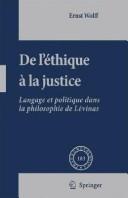| Listing 1 - 10 of 112 | << page >> |
Sort by
|

ISBN: 1281339113 9786611339111 1402061226 1402061218 9781402061219 Year: 2007 Volume: 183 Publisher: Berlin Springer
Abstract | Keywords | Export | Availability | Bookmark
 Loading...
Loading...Choose an application
- Reference Manager
- EndNote
- RefWorks (Direct export to RefWorks)
Emmanuel Lévinas est le philosophe de la non-indifférence; il n’est en aucune sorte un philosophe indifférent. Son inquiétude personnelle et engagement politique ont trouvé une expression philosophique dans une quête à deux versants. Dans le versant ontologique, il cherche à montrer que même si l’homme est l’événement de compréhension de l’être, tout l’homme et toute signification ne se réduisent pas à la compréhension de l’être seul. Dans le versant politique, il s’interroge sur la possibilité de soumettre la tendance totalitaire de toute politique à une recherche de justice qui ne dépend pas finalement de la politique même. Mais ces deux versants n’en font qu’un. La découverte d’une signification qui excède la compréhension de l’être – l’éthique – fournit en même temps la source de renouvellement de la justice. Ainsi, par cette double question, Lévinas nous présente les fils conducteurs de notre enquête : une signification au-delà de la compréhension de l’être et sa portée éthique, que nous appelons « langage » et que nous explorons dans la perspective de son importance politique. Les études analytiques dans lesquelles les notions de politique et de langage fonctionnent comme clef d’interprétation mutuelle débouchent sur une critique centrée sur deux problèmes : l’impossibilité d’interpréter la signifiance de l’autre et le danger inhérent à la conception d’une justice dépassant l’Etat.
Ontology. --- Semantics. --- Political science --- Transcendence (Philosophy) --- Philosophy. --- Lévinas, Emmanuel. --- Being --- Philosophy --- Metaphysics --- Necessity (Philosophy) --- Substance (Philosophy) --- Political philosophy --- Formal semantics --- Semasiology --- Semiology (Semantics) --- Comparative linguistics --- Information theory --- Language and languages --- Lexicology --- Meaning (Psychology) --- Lévinas, E. --- Leṿinas, ʻImanuʼel --- Levinas, Emani︠u︡el --- לוינס׳ עמנואל --- לוינס, עמנואל --- Phenomenology . --- Ethics. --- Philosophy (General). --- Linguistics --- Phenomenology. --- Philosophy, general. --- Political Philosophy. --- Philosophy of Language. --- Deontology --- Ethics, Primitive --- Ethology --- Moral philosophy --- Morality --- Morals --- Philosophy, Moral --- Science, Moral --- Values --- Philosophy, Modern --- Political philosophy. --- Language and languages—Philosophy. --- Mental philosophy --- Humanities --- Academic collection --- Moral Philosophy and Applied Ethics. --- Levinas, Emmanuel.
Book
ISBN: 9789462702554 9462702551 9461663617 9789461663610 9789461663627 Year: 2020 Publisher: Leuven : Leuven UP
Abstract | Keywords | Export | Availability | Bookmark
 Loading...
Loading...Choose an application
- Reference Manager
- EndNote
- RefWorks (Direct export to RefWorks)
Mongameli Anthony Mabona (1929) is a singular South African scholar with an exceptional life path. The history of British imperialism and apartheid shaped the world into which he was born. To a large extent, these powers had his destiny carved out for him. Nevertheless, a curious set of coincidences enabled him to obtain a tertiary education as a priest, to pursue his doctoral studies in Italy and to befriend Alioune Diop. He is one of the first published philosophers of Anglophone Africa and holds doctorates in theology and anthropology. His opposition to institutionalised racism ? including co-authoring the 1970 'Black Priests' Manifesto' - eventually led to his exile. This book documents his life and offers a synoptic reading of his scholarly and poetic work.
Book
ISBN: 9789462702974 Year: 2021 Publisher: Leuven Leuven university press
Abstract | Keywords | Export | Availability | Bookmark
 Loading...
Loading...Choose an application
- Reference Manager
- EndNote
- RefWorks (Direct export to RefWorks)
Martin Versfeld (1909–1995) is one of SouthAfrica’s greatest philosophers, appreciated by academics and activists, poetsand the broader public. His masterful prose spans thetension between disquiet and joy. Detractor of the violent trends of modernity,a critic of apartheid from the first hour, he was among the first philosophersof ecology. At the same time he celebrated the generosity of the world andadvocated an ethics of simplicity, drawing on mediaeval theology and Easternwisdom. His philosophyoffered food for thought in dark times of the 20th century, as it still doesfor us in the 21st century. This first book-length study on Versfeld is aninvitation to think with him on justice and exploitation, cultural differenceand human nature, religion and the environment, time and connectedness. Ernst Wolff is professor ofphilosophy at the Institute of Philosophy, KU Leuven.
Book
Year: 1950 Publisher: Berlin: de Gruyter,
Abstract | Keywords | Export | Availability | Bookmark
 Loading...
Loading...Choose an application
- Reference Manager
- EndNote
- RefWorks (Direct export to RefWorks)
Book
Year: 1950 Publisher: Berlin: de Gruyter,
Abstract | Keywords | Export | Availability | Bookmark
 Loading...
Loading...Choose an application
- Reference Manager
- EndNote
- RefWorks (Direct export to RefWorks)
Book
Year: 1950 Publisher: Tübingen: de Gruyter,
Abstract | Keywords | Export | Availability | Bookmark
 Loading...
Loading...Choose an application
- Reference Manager
- EndNote
- RefWorks (Direct export to RefWorks)
Book
Year: 1950 Publisher: Berlin : de Gruyter,
Abstract | Keywords | Export | Availability | Bookmark
 Loading...
Loading...Choose an application
- Reference Manager
- EndNote
- RefWorks (Direct export to RefWorks)
Book
Year: 1971 Publisher: New York (N.Y.) : Twayne,
Abstract | Keywords | Export | Availability | Bookmark
 Loading...
Loading...Choose an application
- Reference Manager
- EndNote
- RefWorks (Direct export to RefWorks)
Book
ISBN: 9461663625 Year: 2020 Publisher: Leuven University Press
Abstract | Keywords | Export | Availability | Bookmark
 Loading...
Loading...Choose an application
- Reference Manager
- EndNote
- RefWorks (Direct export to RefWorks)
Book
Year: 2021 Publisher: Editions de l'Université de Bruxelles
Abstract | Keywords | Export | Availability | Bookmark
 Loading...
Loading...Choose an application
- Reference Manager
- EndNote
- RefWorks (Direct export to RefWorks)
| Listing 1 - 10 of 112 | << page >> |
Sort by
|

 Search
Search Feedback
Feedback About UniCat
About UniCat  Help
Help News
News